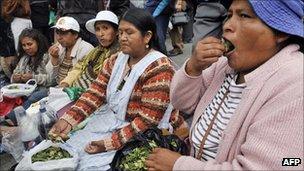Bolivia coca judge defends divination technique
- Published

Coca leaf is at heart of indigenous Andean culture
A Bolivian judge has rejected calls to resign after he admitted "reading" coca leaves to help him make decisions.
Judge Gualberto Cusi - who is from the indigenous Aymara community - said he used the traditional divination technique to help guide his judgement.
But he said he did not let it dictate sentencing.
Coca leaf is a vital element of indigenous culture in Bolivia, and is frequently defended by President Evo Morales.
It has been used in the Andes for thousands of years as a mild stimulant and herbal medicine, as well as a sacrament in religious and shamanic rituals.
It is also the raw material for illegal cocaine.
Gualberto Cusi become a member of Bolivia's Constitutional Tribunal last year when judges were controversially elected by public vote for the first time.
In an interview on Bolivian television, he admitted "consulting" coca leaves when faced with difficult judicial decisions.
President Morales is an outspoken advocate of coca
'Shameful'
The remarks were criticised by government and opposition politicians.
"I think justice has hit rock-bottom, it is shameful and he should quit," opposition congressman Roy Moroni told El Deber newspaper.
"We can't put our trust in people who determine the liberty of individuals by reading coca," he added.
Judge Cusi later sought to clarify his comments, indicating that he relied on coca for spiritual guidance but did not let it determine the outcome of cases.
"In moments when decisions must be taken, we turn to coca to guide us and show us the way," he explained.
He added that coca helped him communicate with "plants, animals, mountains and rivers".
President Evo Morales - who is a former coca grower of indigenous descent - is an outspoken defender of traditional coca use.
Earlier this week he went to Vienna to urge the UN to lift its ban on chewing coca leaf.
Thousands of Bolivians joined a national day of coca-chewing in support of his campaign.
Mr Morales says he is strongly opposed to cocaine production, though the US says Bolivia has not lived up to its responsibilities in the fight against the drug.
- Published12 March 2012
- Published21 January 2012
- Published17 October 2011
- Published21 January 2011
- Published10 March 2011